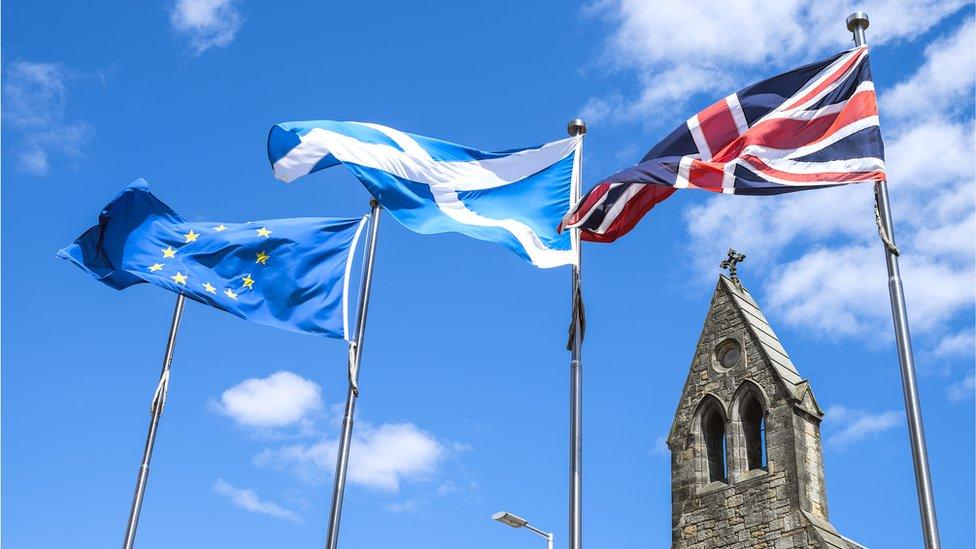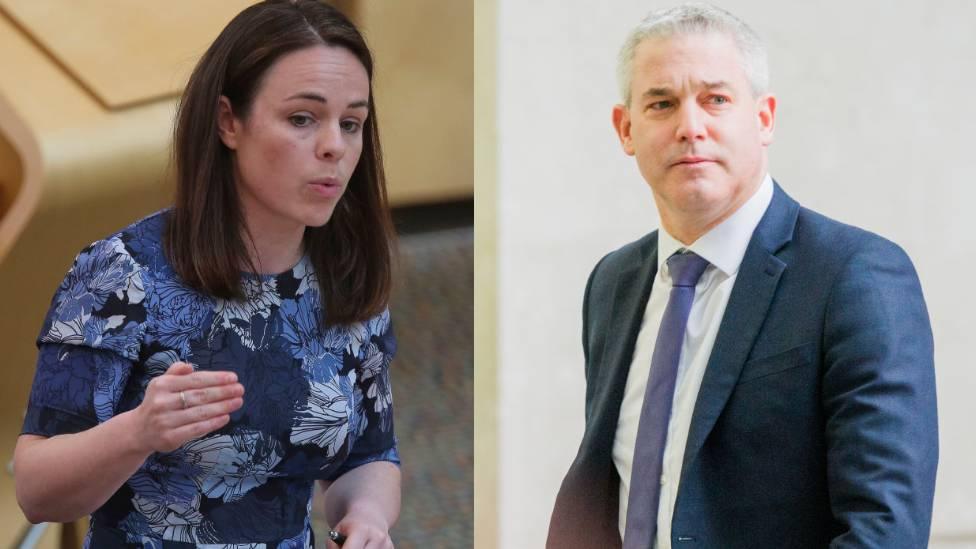New UK Shared Prosperity Fund to bypass Holyrood
- Published

Whitehall is to bypass the devolved administrations and replace European structural funds with a centrally-controlled fund.
In Scotland, that means more than £100m is set to be spent by the UK government on projects normally devolved to the Scottish Parliament.
The Shared Prosperity Fund replaces European Commission development and social fund grants.
The Scottish government has set out its own plans for replacing EU funds.
Stephen Barclay, the UK Treasury Secretary, has removed some of the uncertainty about the way the Shared Prosperity Fund will operate.
In the past seven years, £780m has come through the Scottish government by that route.
It has been spent on transport infrastructure, economic development and workplace training. Following Brexit, that is being wound up.
In a letter to the Scottish Finance Secretary, Kate Forbes, external, Mr Barclay said the Shared Prosperity Fund would be a UK project, aimed at "levelling up" areas in most need.

Kate Forbes was told by Stephen Barclay that the cash would be used to "level up" areas in most need
It said it would average £1.5bn per year, and details of distribution would become clear in the next spending review.
"Levelling up" is a UK project, mainly associated with lower income parts of the north of England.
The Scottish government, and others, have set out their own plans for distributing the replacement for EU structural funds.
Along with English local government leaders, there have been repeated calls for more clarity from UK ministers on the Prosperity Fund.
A Whitehall source confirmed that the letter to Ms Forbes is the first time the Treasury has said the fund will use new powers for Whitehall to spend in any part of the UK.
Growth deals
These were recently passed into law under the Internal Market Act, which was criticised for paving the way to bypass devolved administrations.
The Scotland Secretary, Alister Jack, previously hinted that much of the spending in Scotland could be through local authorities.
Along with city region growth deals, that gives the UK government the opportunity to flag up its commitment to projects of political value to it. However, it also creates a new area for friction with Holyrood, going into the spring election campaign.
The letter from Mr Barclay was in answer to a request from Ms Forbes for a Scottish share of the Covid contingency fund.
Most of the letter, sent on Friday, set out the ways in which the UK government is supporting Scotland directly, in health and economic funding, from furlough payments to shipbuilding contracts.
It said the contingency fund was mainly aimed at testing and vaccination, which are funded from UK central government.
New powers
Mr Barclay wrote to the Scottish finance secretary: "While I recognise the devolved Scottish government has an important role to play, the overwhelming majority of Covid support to businesses and people across the UK is and will continue to be delivered through the UK Treasury.
"It is disappointing that your letter and your public comments generally fail to mention the depth of support that has been available and continues to be provided".
It went on: "The UK Shared Prosperity Fund will help to level up and create opportunity across the UK in places most in need.
It will operate UK-wide, using the new financial assistance powers in the UK Internal Market Act.
"We will ramp up funding so that total domestic UK-wide funding will at least match EU receipts on average reaching around £1.5bn a year.
In a statement, Ms Forbes said the change confirmed what the Scottish government had feared following the UK's exit from the EU.
"We need urgent reassurance that there will be a full replacement of all lost EU funds. Scotland must receive at least £1.283bn for a replacement seven-year programme for 2021-2027.
"It is also vital that control over any new arrangements remains in Scotland. Otherwise this threatens to be a significant power grab over Scotland's powers to target investment and to make decisions based on what's best for the people, businesses and communities of Scotland.
"I urge the Chancellor to provide clarity ahead of the Scottish Budget on 28 January."